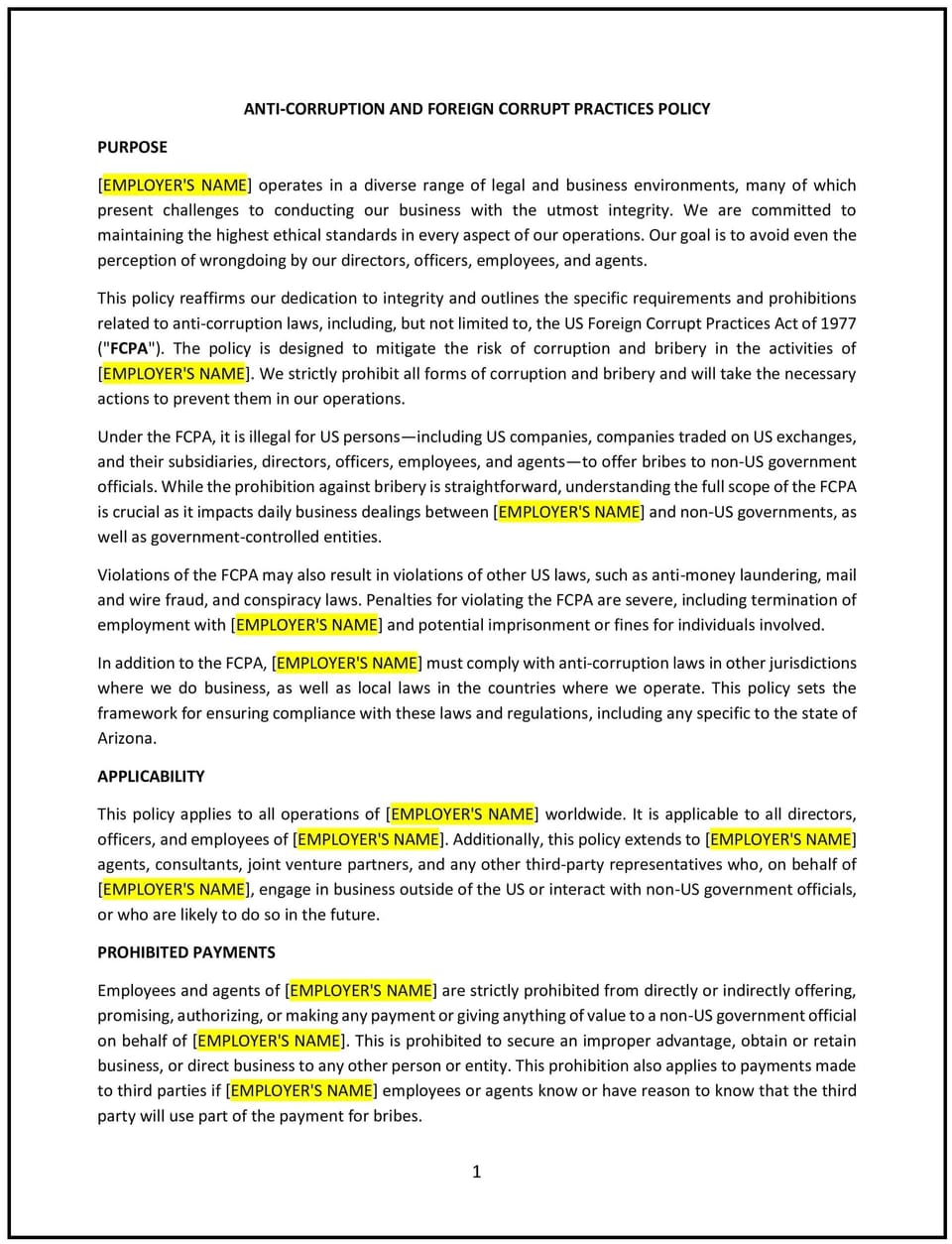Anti-corruption and foreign corrupt practices policy (Arizona)

Anti-corruption and foreign corrupt practices policy (Arizona)
In Arizona, an anti-corruption and foreign corrupt practices policy helps businesses maintain ethical standards and comply with federal and state regulations, such as the Foreign Corrupt Practices Act (FCPA). This policy is particularly important for organizations engaging in international business or dealing with government entities, ensuring transparency and accountability in all transactions.
This policy outlines prohibited practices, such as bribery or improper payments, and provides guidelines for employees and third parties to identify and report unethical behavior. It also includes procedures to mitigate risks associated with corruption, enabling businesses in Arizona to operate with integrity and safeguard their reputation.
How to use this anti-corruption and foreign corrupt practices policy (Arizona)
- Establish clear expectations: Define prohibited practices, such as bribery, kickbacks, or facilitation payments, and outline acceptable behaviors for employees and third-party partners.
- Implement a reporting system: Provide a confidential mechanism for employees and third parties to report suspected corruption or unethical practices, ensuring protection against retaliation.
- Conduct regular training: Educate employees, contractors, and partners on identifying corruption risks and complying with Arizona and federal anti-corruption laws.
- Monitor high-risk activities: Identify and scrutinize transactions, particularly those involving government officials or international dealings, to mitigate potential risks.
- Review and update regularly: Periodically assess the policy’s effectiveness and ensure it reflects changes in laws, industry practices, or organizational structure.
Benefits of using an anti-corruption and foreign corrupt practices policy (Arizona)
This policy offers numerous benefits for businesses in Arizona:
- Protects reputation: Maintains the organization’s ethical standing by preventing corrupt practices that could harm its credibility.
- Supports compliance: Aligns with federal regulations like the FCPA and Arizona-specific laws, reducing the risk of legal penalties or disputes.
- Enhances employee accountability: Encourages employees to adhere to ethical standards and report violations, fostering a culture of integrity.
- Mitigates financial risks: Prevents potential losses associated with corruption, such as fines, legal costs, or damaged partnerships.
- Builds stakeholder trust: Demonstrates commitment to transparency, strengthening relationships with customers, investors, and partners.
Tips for using an anti-corruption and foreign corrupt practices policy (Arizona)
- Emphasize Arizona-specific considerations: Tailor the policy to include guidelines for dealings with state and local government officials, reflecting Arizona’s regulatory environment.
- Ensure third-party compliance: Extend the policy’s scope to contractors, suppliers, and partners to minimize risks across the supply chain.
- Document all transactions: Maintain detailed records of transactions, especially those involving high-risk entities or government officials, to demonstrate transparency.
- Provide whistleblower protection: Include provisions to protect employees who report suspected corruption, fostering a safe reporting environment.
- Integrate into overall compliance efforts: Align the policy with other compliance initiatives, such as anti-money laundering or corporate governance practices, to ensure consistency.
Q: How does this policy align with the FCPA?
A: The policy incorporates FCPA guidelines, prohibiting bribery of foreign officials and requiring transparency in financial transactions, helping businesses comply with federal regulations.
Q: Are facilitation payments allowed under this policy?
A: No, this policy strictly prohibits facilitation payments, aligning with best practices for anti-corruption compliance.
Q: How can employees report suspected corruption?
A: Employees can report suspected violations through a confidential reporting system, such as a hotline or online portal, with assurances of non-retaliation.
Q: What training is recommended for compliance?
A: Regular training sessions should focus on recognizing corruption risks, understanding legal requirements, and applying the policy in day-to-day operations.
Q: Does this policy apply to contractors or third parties?
A: Yes, the policy applies to all third parties working with the organization, including contractors, suppliers, and consultants, to ensure compliance across the supply chain.
This article contains general legal information and does not contain legal advice. Cobrief is not a law firm or a substitute for an attorney or law firm. The law is complex and changes often. For legal advice, please ask a lawyer.


